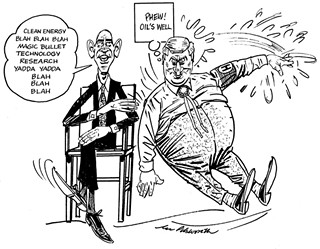Were those really beads of sweat glistening on Pete Mansbridge's polished pate last Wednesday? The CBC TV anchor had worked himself into a lather on the eve of a presidential stopover in Ottawa. "What's at stake when Barack Obama knocks on Stephen Harper's door?" Mansbridge bellowed. "This meeting is unlike any other in recent memory in Canada and what comes out of it could affect things in both countries for years to come." Not to be outdone, Ottawa bureau chief Keith Boag compared the Obama-Harper tete-a-tete to a romantic rendezvous. "The most important thing tomorrow is for the leaders to find the chemistry to develop a strong relationship---something like a first date."
After that set-up, the presidential visit seemed anticlimactic. The highlight came when a smiling Obama waved from behind bullet-proof glass to well-wishers on Parliament Hill. Things went downhill from there. After lunching on Arctic char and Plains bison, the two leaders announced "a new initiative." Yes, "a clean-energy dialogue" to come up with what Harper called "clean-energy science and technologies that will reduce greenhouse gases." Obama mentioned research to advance "carbon reduction technologies" and to "support the development of an electric grid that can help deliver the clean and renewable energy of the future." Nothing wrong with that, I suppose, but hardly as earth-shattering as Perspiring Pete promised.
And that's what I hate about these contrived PR events. Prominent journalists may fantasize about momentous decisions and romantic chemistry, but events like this are really about slogans and spin. When a reporter referred indirectly, for example, to Obama's pledge to wean the US off dirty oil such as the 780,000 barrels a day it imports from western Canadian tar sands, the new president expertly dodged that part of her question and skated smoothly back to his clean-energy message track. He began by observing that the US also depends on its own dirty coal. "And if we can figure out how to capture the carbon, that would make an enormous difference in how we operate," he added. "Right now the technologies are at least not cost-effective. So my expectation is, is that this clean-energy dialogue will move us in the right direction."
Obama's techno-babble about capturing carbon, cost-effective technologies and a clean-energy dialogue conjures up no troubling images of belching tar sands smoke stacks and pillaged forests. Tar sands oil production emits three times more greenhouse gases than conventional oil and threatens the destruction of a wilderness the size of all three Maritime provinces. As Obama himself knows, tar sands production is driven by an insatiable American thirst for oil. Journalist Andrew Nikiforuk points out in his recent book on the tar sands that with only five percent of the world's population, the US consumes 25 percent of its oil. And thanks to the tar sands, Canada has now become its biggest foreign supplier. "Canadian crude now accounts for nearly one-fifth of all US oil imports," Nikiforuk writes. "If development continues unabated, Canada will soon provide the fading US empire with nearly a third of its oil."
Stephen Harper, a global warming skeptic, boasts that the tar sands have helped make Canada an energy superpower. Harper is not about to interfere with the juggernaut of tar sands development, which he compares to "the building of the pyramids or China's Great Wall." Obama meanwhile, is stuck between the rock of American oil consumption and the hard place of environmental catastrophe. To make real change, he must persuade a fractious Congress, a vociferous right-wing media and a distracted and confused public that dirty oil is not worth its steep environmental price. In that daunting endeavour, a clean-energy dialogue with Stephen Harper will achieve sweet fuck all. Obama needs a strong push from his allies in the environmental movement. Otherwise he's stuck in the middle of a toxic Alberta sludge pond without a paddle.
Is Alberta the economic engine of Canada or the beginning of the end of a climate-changed world? Let me know at [email protected].
















